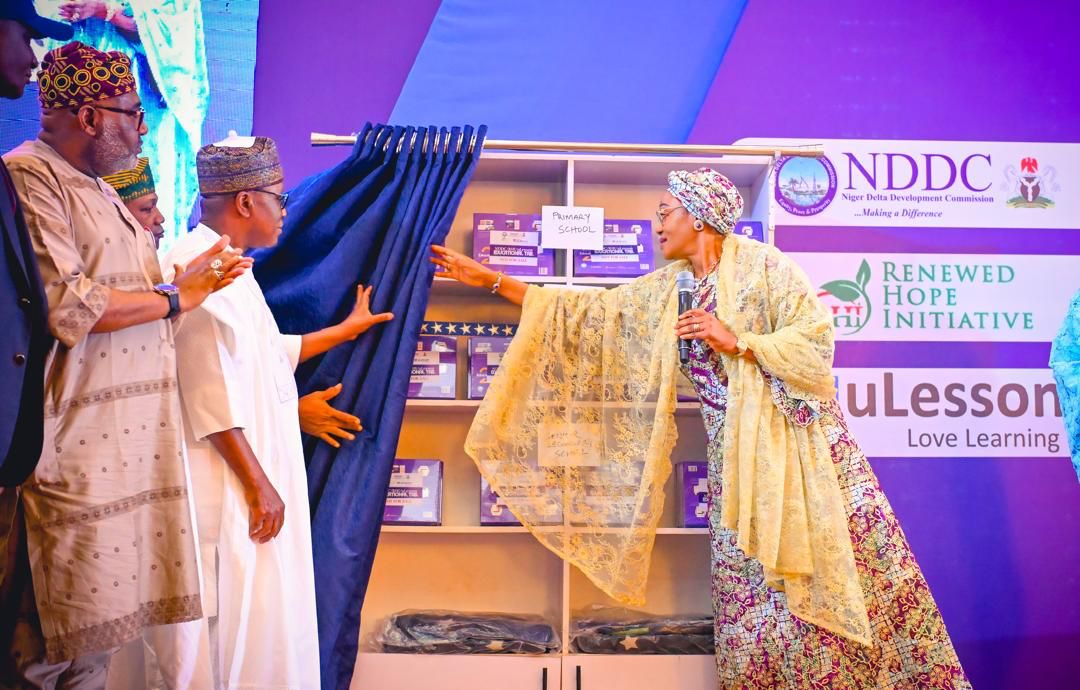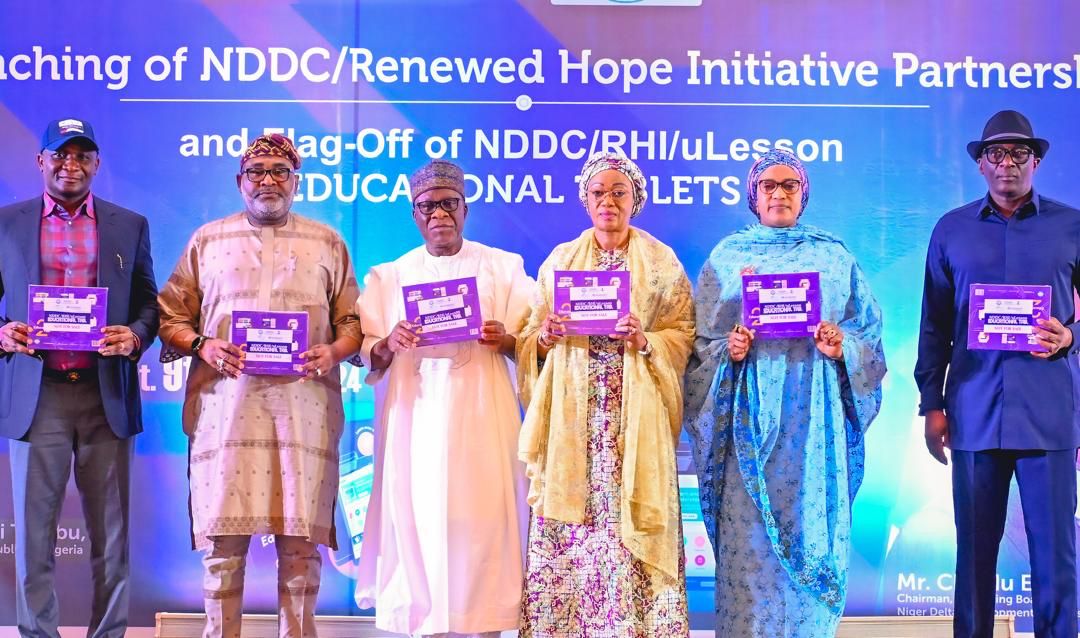Nigeria’s First Lady, Oluremi Tinubu, has flagged-off the distribution of 45,000 units of U-Lesson tablets; an educational tool for use by secondary school students in nine States across the Niger-Delta region of the country.
She affirmed that the country must ensure inclusive, equitable and quality education is given to citizens especially children of school age, in line with the Sustainable Development Goals, Goal 4.
 Mrs Tinubu stated these at the flag-off the distribution of U-lesson tablets to primary and secondary schools in the nine States of the Niger Delta Region in Nigeria, at the State House Conference Center, Abuja on Saturday.
Mrs Tinubu stated these at the flag-off the distribution of U-lesson tablets to primary and secondary schools in the nine States of the Niger Delta Region in Nigeria, at the State House Conference Center, Abuja on Saturday.
The event was organized by the Niger Delta Development Commission (NDDC) in collaboration with the First Lady’s pet project, Renewed Hope Initiative.
The First Lady said doing so will promote all-time learning opportunities for all, as well as enable students in schools across the country to be equipped with digital tools.
Educational Revolution
She noted that digital lesson devices are revolutionizing education across the world and Nigeria cannot afford to be left behind.
 “These devices provide access to a wealth of educational resources that will empower students to learn at their own pace and style, in addition to classroom teachings. Rather than mere gadgets of recreation, these tablets serve as powerful teaching tools that foster academic excellence, creativity, and innovation.
“These devices provide access to a wealth of educational resources that will empower students to learn at their own pace and style, in addition to classroom teachings. Rather than mere gadgets of recreation, these tablets serve as powerful teaching tools that foster academic excellence, creativity, and innovation.
“By harnessing the power of digital learning resources, it will enhance students’ engagement, streamline curriculum development and accessibility, and ultimately boost student performance and achievement,” she said.
An educationist herself, Mrs Tinubu commended the fact that the U-Lesson education software is tailored to align with the Nigerian educational system, ensuring its relevance to the nation’s local context.
“One of the prominent features of this software is its offline video library, which allows learners to play, pause, and rewind educational content without the need for an internet connection.
“Additionally, the software includes parental controls and a long battery life of up to 18 hours, making it a reliable and safe tool for both students and teachers.”
She said as the education software, services, and tablets are distributed, Nigeria is taking a significant step towards achieving the Sustainable Development Goals’ Goal 4, which seeks to ensure inclusive and equitable and quality education for all.
“By equipping our schools with these digital tools, we are not only supplementing traditional face-to-face instruction but also empowering students to master their materials and perform better in their tests and examinations, as we believe that every student in Nigeria deserves access to quality education, and government is dedicated to providing the necessary resources to make that a reality.”
Future
Mrs Tinubu further implored students, teachers and parents who she said are all stakeholders, to embrace this opportunity with great enthusiasm and optimism.
“To the students, I hope that these tablets will inspire you to dream big, work hard and achieve your goals. Remember, education is the key to unlocking your potential and shaping your future.
“Let us encourage our children to study and learn on these devices. Together, we can harness the power of technology to build a better future for our country, where every child has the tools and opportunity to succeed,” the First Lady advised.
The Managing Director of NDDC, Samuel Ogbuku, outlined the significance of the initiative saying it is a special project, aimed at boosting education in the Niger-Delta region.
“This is just the first phase of our project. We recognize that there are more than 45,000 students in the Niger Delta who need access to these resources, and we will continue to engage U-Lesson to produce more tablets for our students.”
He stressed that investing in digital technology is crucial for creating equality in education.
Addressing concerns about equitable distribution, Ogbuku assured that the NDDC is committed to delivering tablets to functional schools rather than merely distributing them politically.
“We are collaborating with the Renewed Hope Initiative and state education ministries to ensure that these resources reach deserving students,” he stated.
Partnership
He added that the NDDC has also partnered with U-Lesson to establish offices in each of the nine states for immediate technical support and training for teachers on using the tablets effectively.
The Minister of Regional Development, Abubakar Momoh expressed optimism about the collaboration, stating, “This partnership represents a shared vision of prosperity and self-reliance for every child, youth, and woman in our communities.”
He stressed that the initiative targets critical areas of sustainable development, including education, health, youth empowerment, women’s empowerment, and agriculture.



Comments are closed.